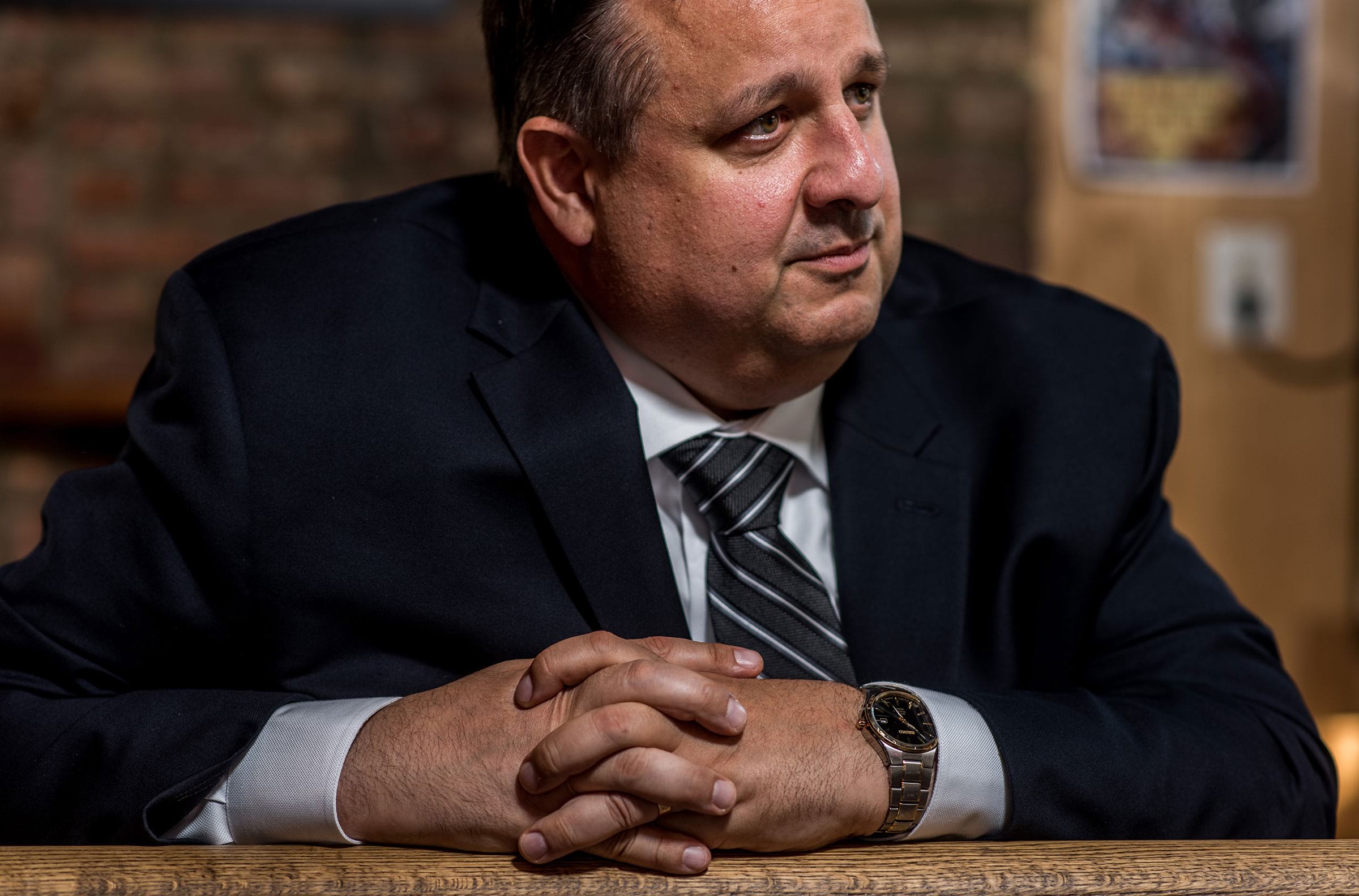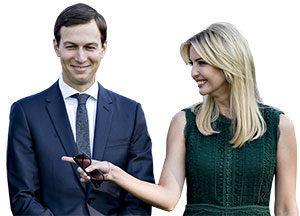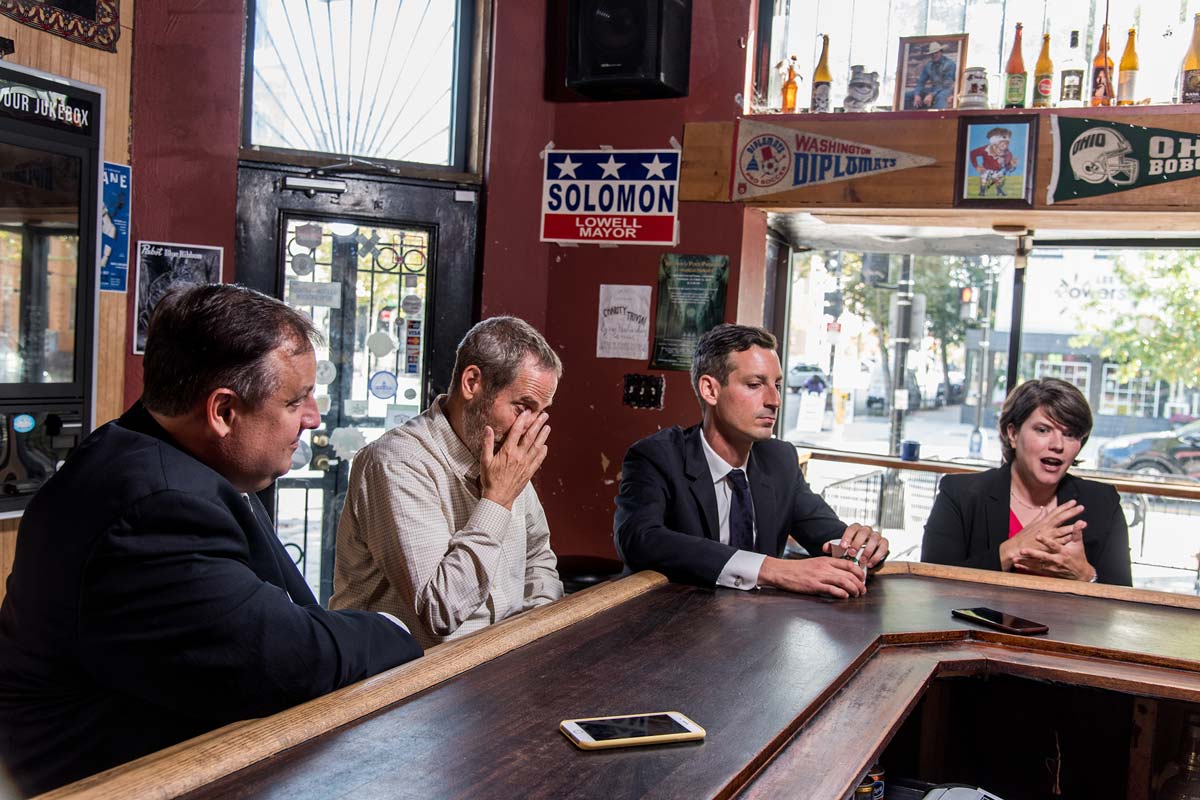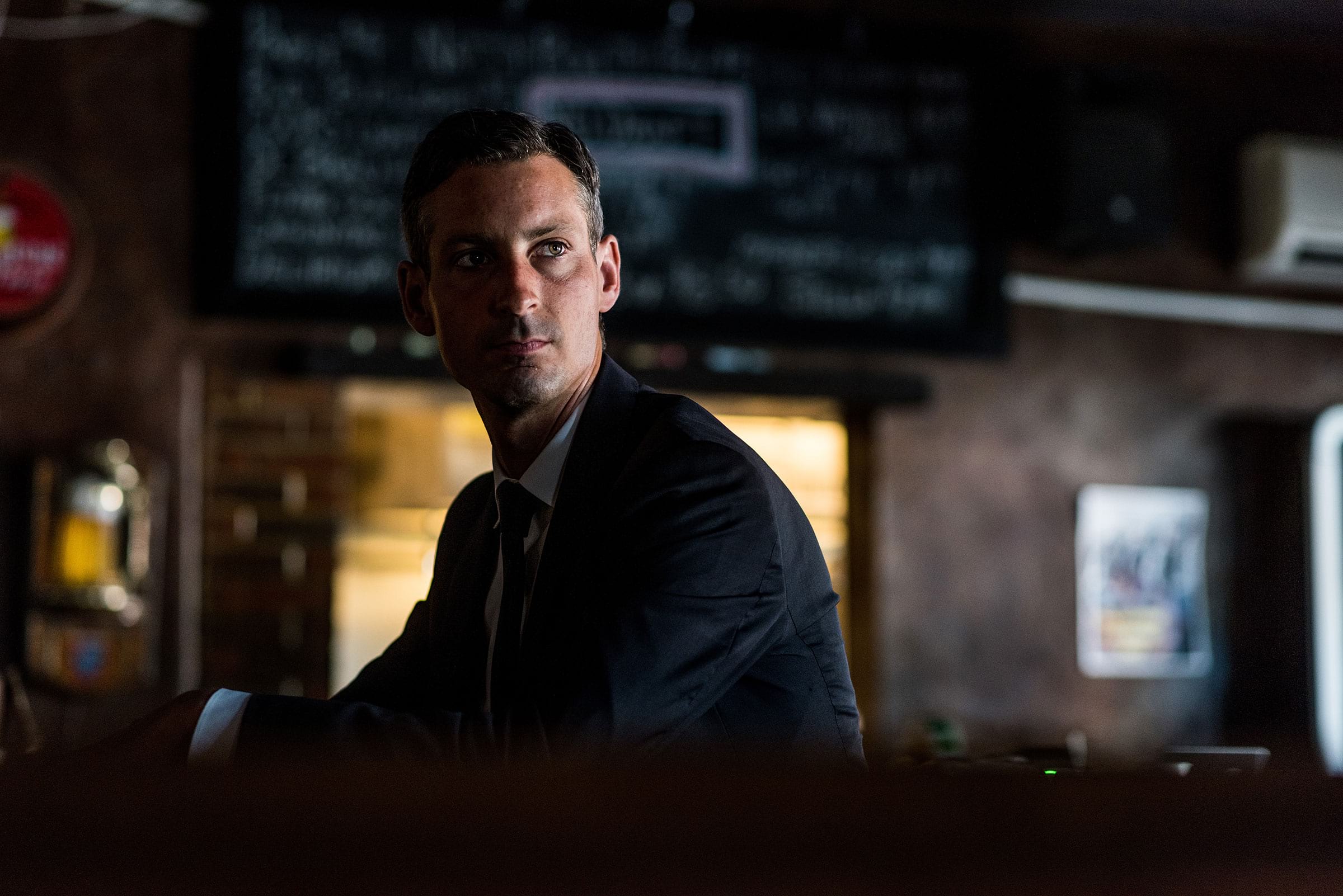INTERVIEW BY LYDIA POLGREEN
PHOTOGRAPHS BY STEPHEN VOSS
I have met Trump haters before, lots of them, the kind who seize upon every conspiracy theory and refuse to give him any benefit of any doubt. The four people I recently spent the morning with at Solly’s Tavern in D.C. (sans booze, don’t worry) were not Trump haters. They were, however, Trump quitters.
All of them, at some point over the course of the last nine months, had left their posts within the current administration, having decided that they could better serve their country from outside the government than from within. They weren’t happy about quitting, either. They were civil servants who wanted to remain civil servants, who, except for one, had worked under presidents of both parties. They had disagreed with superiors over the years, they had been fearful of new regulations and wary of political appointees, but they stayed on because that’s the nature of career work in government. This was different.
When they came together for this discussion two weeks ago, the rapport was instantaneous. The vibe was as convivial and familiar as a reunion, except for the fact that they had been strangers five minutes before. They hailed from different parts of the bureaucracy, they ranged widely in age and background, but they had undergone such similar mental calculations since Trump’s election. Would their friends at work feel betrayed by their quitting? Would they be opening up their job to someone with views antithetical to their own? Having spent most of their lives in back offices, did they really feel comfortable taking such a public stand? Once we got into the interview proper, which has been edited and condensed for clarity, they were candid, funny and furious. They may not work for the government anymore, but they all still see themselves as public servants.
All right, Sharon, you were the first to flee. Let’s start with election night. What were you thinking? What did it feel like?
There was this sense of dread that started to take over me, like in a very physical way. So the day after the election, my wife and I decided that we needed to stay home and regroup as a family. As a same-sex couple in this country, we knew exactly what the stakes were. And for the first couple of days, I tried to will myself to a place where I could think: maybe Trump didn’t really mean a lot of it, maybe it was just for the ratings. And it sort of worked! At least until Jeff Sessions was announced as the nominee for attorney general. That’s when I knew my days within the government were numbered.
You had no doubt you had to go?
Walt, you stuck around until July. Talk to me about the moment when you realized your world had fundamentally changed.
My story differs because I woke up the morning after the election fairly optimistic about the work I was going to be doing with the transition team. We had spent about five months working with them before the election, and they were very knowledgeable and earnest individuals.
“A man so austere and self-effacing that he stripped his office of all decorations,” according to The Atlantic, he is now a senior director at the Campaign Legal Center.
So I sent a cheerful congratulations email to the one side and a condolence email to the other, and I got responses from both thanking us for OGE’s work. The folks on the Trump team said they were really looking forward to continuing our work together and that they’d call that afternoon to set up some times to meet. The transition is about 73 days, and you’ve got that amount of time to stand up an entire government. You need to know what you’re doing, and you need to use every second wisely. It is a monumental task. But by that afternoon, all of the people we had worked with disappeared, and then we had radio silence.
Later, we read news reports that suggested that Don McGahn
A long-time D.C. fixture who now serves as White House counsel.
Still, the highlight for me, or the lowlight, rather, was one weekend when nobody could figure out where Don McGahn was, and then we read in the newspaper that he did a gig with his ’80s cover band up in Philly.

Mike, civil servants at the Environmental Protection Agency have long struggled with political appointees. Why do you think the situation is so much worse now?
I’ve worked with six administrations—from Reagan’s until this one—and we’ve had differences in opinion, but there was never the feeling anyone was coming in to dismantle the organization and really do damage to it. But we felt like that from the very first time Scott Pruitt
Here’s his resignation letter; it's a scorcher.
The new EPA chief. He sued the place 14 times before he took it over.
It’s a hard habit to break.
Yeah, it’s still “us.” So when he started talking about how we need to work with the states, well, I worked there 30 years, and we worked with the states every single day. He said we have to abide by the rule of law, as if that’s something we weren’t doing. There was this fundamental feeling he didn’t get it, or if he did, he was purposely poking a finger in the staff’s eye.
The second big thing was the budget cuts—a roadmap to cut EPA employees by 30 percent. And then just chopping programs around climate change. Many people thought, How could the head of EPA say climate change is not a part of our mission? We felt the core of what we did, I don’t want to use the word “violated,” but it was being undermined. And the last thing I’ll say is, he brought in Senator James Inhofe’s former chief of staff to run his organization.
Was there a specific thing that made you decide this is it, I’m putting in my papers, I’m done?
I’ll be honest. I was scheduled to retire in February. I thought Clinton was going to win, I was going to retire, somebody would take on my climate change stuff, and everything was going to be great. Then Trump won, and when I was getting ready for retirement, people kept going, “Mike, you can’t retire. You can’t, because your job is going away, and you’re an advocate. We need you.”
In the end, I decided to retire. And to be honest, I regret that. I wish I would’ve stayed because even though I don’t think I would’ve made a huge impact, I still feel like I could’ve been a voice. And if I would’ve gotten fired, that would’ve been fine.
Ned, like Walt, you worked for an institution that’s supposedly above politics. But tension with a new administration is not necessarily a new thing at the CIA. How was this different?
During the Bush-to-Obama transition, I was working in the Counterterrorism Center. I’ve always believed myself to be fairly progressive, especially on social issues. But I also had a profound sense of unease at some of then-candidate Obama’s rhetoric on the campaign trail. I was concerned that the strategies and tactics that had allowed us to gain such an advantage over groups like al Qaeda would be rolled back, and that the agency as well as the broader national security establishment would need to fight with its hands tied behind its back.
He now teaches at George Washington University and contributes to MSNBC.
But what we found is that President Obama proved himself to be someone who was willing to do what needed to be done, while also following through on some of his core convictions that I think many of us actually agreed with: ending the agency’s detention operations, making clear that the agency would not be allowed to engage in anything even close to resembling torture.
So fast-forward to January. What was that experience like?
It actually began for me during the campaign when I heard candidate Trump repeatedly take on the intelligence community in an aggressive, concerted manner. It wasn’t just the fact that he was citing WikiLeaks. It wasn’t just the fact that he was comparing the intelligence community to Nazis. You could sort of dismiss all that as rhetorical flourish. But he would just automatically cast aside the high-confidence analysis of the intelligence community on things like Russia’s meddling in our election, and he would call that fake news, and he would call it a hoax.
That he didn’t respect the weight of serving as commander in chief really came to the forefront on his first full day in office, when he went out to CIA headquarters in Langley. He stood before the Memorial Wall, the wall marking the CIA officers who had given their lives in the line of duty, and talked about the size of the crowd at his inauguration. He joked about going back into Iraq to steal Iraq’s oil. A mentor of mine is etched into that wall, as are several former colleagues.
When did you start thinking about getting out?
The final straw for me was when they put forward the memorandum that named Steve Bannon to the National Security Council. It removed the CIA director and the director of national intelligence, as well as the chairman of the Joint Chiefs of Staff from the principals committee. And that confirmed in my mind that this was an administration that would look to political advisers and ideologues. I decided as an intelligence analyst, I would either be twiddling my thumbs all day, or producing reports that would gather dust.

What are commonalities in all the stories we’re hearing?
I think it’s that there was a concerted effort to pick the appointees who were the most thumb-in-the-eye choices for the agency they were serving. That deconstructionist kind of mantra, where you want to send a message of how fundamentally disvalued the work and the people are at a certain agency.
I’m not comparing this to what happened at the Memorial Wall, but the president came to EPA in March, and the day that he came, they sent out a note to all staff. They called the event “Our Big Day.” And the note said that the president was going to basically roll back all the climate change progress that had been made under Obama. And this is “Our Big Day”?
Right, who is the “our”?
Another thing that seems to cut across all our experiences is that these are people who don’t care for other opinions. On many occasions, they would ask to be provided with background on a specific issue and indicate that there would be a follow-up meeting. But those would never happen. Once it got to decision time, Pruitt and his closest staff would just do what they wanted to do, and that was that. And the EPA is a science organization! We’re supposed to value facts! Even during the Bush administration it wasn’t like this.
The commonality that strikes me is that I don’t think anyone here sought to be in this position. I mean, speaking for myself, I loved my job. I was more than content to be a bureaucrat for the rest of my life. And, frankly, I hope to go back into public service when the coast is clear.
I think once again my experience is a little different, or at least my focus. I’m less focused on the policy views. My big concern has more to do with what I call “the container.” I see the structures of our representative form of government as the container, and then the policy as just whatever you dump into it.
What has concerned me is the assault on the container. When you have a president who retains his financial interest, even if you’re supportive of him, you can’t know what his decisions are based on. And that becomes particularly acute when you see him praising [Recep Tayyip] Erdogan for seizing more power, or inviting the murderous [Rodrigo] Duterte to Washington, when he has property interests in Turkey and the Philippines.
But the commonality I’m hearing is the unwillingness to rely on experts. At OGE, we saw ourselves in the solutions business. So let’s go back to the president’s financial interests. I have repeatedly said that he needed to sell them. But even if he wasn’t willing to sell them, we could have come up with other solutions that could have mitigated the harm, such as saying no administration official will attend any event at a Trump-branded or -owned property. That might’ve stopped Kuwait and Bahrain and other countries from holding events there, or politicians or charities from doing fundraising events there, because they would’ve known not a single person from the White House would’ve walked through the door. We also could have recommended that he follow the nepotism precedents instead of having the Department of Justice reverse its decades-old position on nepotism.

So when the White House smears me and says I somehow was trying to undermine them, the truth is, if they had done what I recommended, they would’ve been stronger for it.

Walt, I heard you had a mental checklist that helped you decide whether to stay or go.
Yes, it’s a three-part checklist I’ve recommended for others. The first is: Can I perform the mission effectively? Then: Can I perform my job ethically and morally? And three: Can I tell the truth? I certainly didn’t shy away from telling the truth. I felt I was performing my mission morally and ethically, but I reached a point where I didn’t think I could actually achieve the mission effectively. And I kept asking myself that question every month. And for several months, I stayed because all was not lost.
For instance, despite all this new private jet business,
He’s referring to the apparent allergy some Cabinet leaders have to commercial air travel.
We had some Cabinet officials who were much more hostile. But ultimately, we were in our element dealing with them, and we had allies in their own paid attorneys who were telling them this actually makes sense. We similarly had success when we won a battle to get our hands on the ethics waivers the White House was issuing.
Waivers allow government employees to get around certain ethics requirements, and the Trump administration was handing some out in secret.
Still, the biggest surprise came after I finally saw the waivers. Many of them were unsigned, undated and either explicitly or implicitly retroactive. Of course, if you need a retroactive waiver, it means you’ve broken a rule. In addition, two of the waivers were given to a group of employees that seemed to include the individual who issued the waiver. He may have just given himself a waiver.
At that point I realized these guys were capable of just about anything. And they had also started to adapt to my going public with these ethical breaches by simply cutting OGE off. That put me in the position of knowing I would have to certify a number of White House financial disclosure reports without knowing what the appointees did for a living. So I became concerned that I would be window-dressing for corruption.
What are relationships with your former colleagues like now?
Since I’ve gotten out, I’ve gotten many emails from people—not just colleagues in the Civil Rights Division, but also people I used to go toe-to-toe with—saying, “I’m so glad that you’re doing what you’re doing.” So many people want to leave, but it’s such a difficult and personal decision. Some are the breadwinners for their family. For others, there is this terrible tension of, If I go, who would take my place? People are describing it almost like drowning. Like, how long can I hold my breath and stick it out, because I want to be able to put the pieces back together after this is all over?
When I talk to them about my decision, it really is with a heavy heart and with a real sensitivity to make sure it doesn’t sound like I was so pure. I just knew that my work and my passion would be better used in more of a resistance posture. I also recognize that I have tremendous privilege. Since I know that folks still on the inside, so to speak, are struggling to figure out how to maintain their sense of integrity and pride in the work that they do, I feel like it’s really important to lift them up and let them know that they aren’t betraying all that is right and good in the world.

I found myself in a similar position. When I was getting ready to go forward with my resignation, I wasn’t too concerned about how trolls on Twitter or people in the current administration would react. I was most concerned about whether my former colleagues would believe that I thought of myself as holier than thou.
So it’s been really heartening that they still see me as part of the same team. They still see me as someone who is in many ways working on behalf of their interests.
I have a joke theory that you can look at people’s social media accounts and tell where they are in the job hunt process. When the sass factor turns up a little bit, I’m like, Oh, they must’ve gotten a second round interview. On the flip side, when I notice an uptick in folks asking me if I’d be willing to serve as a reference, I feel a sense of dread that something bad must be in the works that is pushing this person over the edge. Usually, though, there’s a bit of lag time before I can figure out what that bad thing is.
For me, it’s been more cold turkey. I worked with these people for a decade and a half, and although I am technically allowed to talk to them, I’m worried there would be a picture in the paper showing me having lunch with them, and I’d be falsely accused of talking substance. So I’ve been staying away. That’s the human element here: I just really miss them.
I have a question. Do people reach out to you from your organizations and ask you to help amplify one issue or another?
My former colleagues, they’re in a tough spot because they’re privy to classified information and I no longer am. And, of course, they haven’t been divulging classified information to me, but they have been speaking to broader issues, like workforce morale within the intelligence community, what’s going on personnel-wise on the National Security Council, as well as the elements of disarray that continue within the White House.
The thing that strikes me is the deep sense of paranoia. No one will just text me or call me. They’ll all start a conversation by asking if I’m on Signal, or if I’m on WhatsApp. Choose your encrypted service. What’s funny is that they will ask me that, and then the next day I’ll get a message from them on Signal saying, Hey, how are you, I just wanted to catch up.
They’re just talking about personal things?
Exactly. There’s no divulging of anything classified or sensitive.
But the feeling is that even to be seen associating with someone who left is scary.

Were you at least able to engage in some good gallows humor before you left?
The week after the election, I emailed a friend of mine in the civil division—someone I had clashed with before—and asked him if he was brushing up on his Korematsu.
I wonder if this is all going to have a chilling effect on young people aspiring to go into public service.
I definitely would do the circuit of singing the praises of government service and how powerful it is, particularly for me. Whenever someone would talk about the government as The Man, I always used to joke that, well, apparently the man is a 5-foot-3 lesbian from Queens. So, if I can be The Man, then anyone can.
But now, it’s much harder for me to convince people that federal service is where they can go to feel the kind of fulfillment that I did when I was there. Knowing that power of the federal government is being used to cause so much harm—to tear families apart, to endorse discrimination—it actually feels insensitive for me to try and sell federal service to someone who is part of one of the communities targeted for abuse. I look forward to the day when that is no longer the case.
Well, I’m very worried about the chilling effect. I want to take this opportunity to encourage young people to go into public service. And there are lots of different forms of public service. There’s state and local government, there are nonprofits and, yes, there is the federal government, which I still highly recommend. For the young people coming in, they’re going to be at the lower levels and insulated from some of the turmoil. At the same time, they wind up getting a lot of responsibility at a very young age. And they can make a difference by trying to provide basic services to a nation.
Public service really is its own reward. I mean, I still have student loans, so it has to be its own reward.

